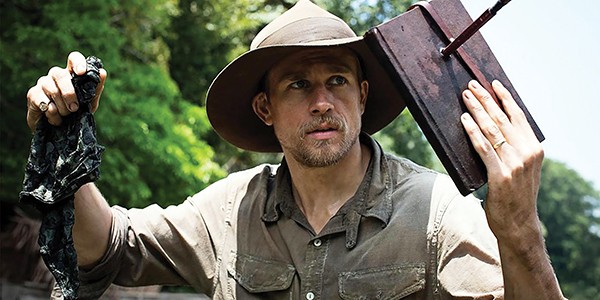In the beginning of The Lost City of Z, Percy Fawcett (Charlie Hunnam), an officer in the British Army, gets notice that he is being called from his sleepy post in Ireland to an uncertain mission of exploration in South America. “It will be a grand adventure,” he is told.
Fawcett had experience as a cartographer and had traveled “all around the empire,” sometimes as a spy. Bolivia and Brazil were on the verge of war over a border dispute, so, to keep the peace, the British were sending Fawcett to map out the full extent of the border by finding the source of the Rio Verde. The catch was the “green river” got its name because it ran straight through the heart of the Amazon jungle. He and his team of surveyors were being sent where no man had ever gone before.
Once he’s in country with his team, Corporals Costin (Robert Pattinson) and Manley (Edward Ashley), Fawcett discovers that the part about going where no man has gone before is not strictly true. At best, he’s going where no white man has ever gone before. As he and his crew struggle up the river, an Amazonian guide tells him that the jungle was once home to an ancient civilization that was, in its day, the equal of the great cities of Europe. It was a place of “gold and maize” now lost to the encroaching jungle.

Fawcett soon learns the harshness of the jungle. Almost immediately, the confident Englishman starts losing members of his expedition to native arrows, piranhas, and, worst of all, infection and disease. But Fawcett was more stubborn than the jungle, and he finds the idyllic falls where the river begins. While they’re surveying the site, he stumbles across a cache of pottery shards in what should be a trackless forest. He takes the artifacts to be proof the tribesman was telling the truth.
Thus begins an obsession that will last the rest of Fawcett’s life, bringing him fame and fortune but costing him everything. In a raucous meeting of the Royal Geographical Society, he proclaims that the “savages” of the jungle are “made from the same clay” as white men. He will return to the Amazon to find evidence of the ancient lost city, which he calls Z — only he pronounces it “zed,” because he’s English and all.
That the meetings of geographical societies used to be such animated affairs is one of the revelations of James Gray’s film. Another revelation is that Gray has amazing classical chops. Old school film grammar evolved for a reason, to tell complex stories visually, and with emotional heft. The Lost City of Z is a testament to the contributions of masters like David Lean. His visual compositions import information clearly and efficiently while also being quite beautiful in the process.
Other recent obsessive, man-vs.-nature stories, such as Iñárritu’s The Revenant, are hyper-focused on the details of the task and toll of surviving in the wilderness. Gray, who also wrote the screenplay, lets us know not only the harrowing difficulties Fawcett faced in the jungle, but also the man he was back home. Our hero spends almost as much time with his wife Nina Fawcett (Sienna Miller) in England as he does in the Amazon. Nina is the long-suffering mother of three who keeps the hearth warm through her husband’s long absences. Fawcett is obsessed with finding the lost city but also acutely aware of the emotional toll his obsession has on his family and himself. Gray wants to make Fawcett into T. E. Lawrence — trapped between worlds, driven by impulses he doesn’t fully understand — and Hunnam rises to the occasion as best he can. Peter O’Toole’s Lawrence of Arabia wore his heart on his sleeve, while Hunnam’s Fawcett is a strictly stiff-upper-lip type.
The subtext running through the story is the English establishment’s unquestioned philosophy of white supremacy and how that clashes with Fawcett’s observations. The issue comes to a head when World War I breaks out just as the explorer is returning from an unsuccessful expedition, and Fawcett is drafted to lead a battalion into battle. Next to the scenes of industrialized slaughter in the Somme, the kindly cannibals of the Amazon seem pretty civilized.